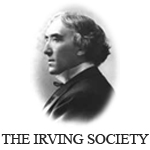Russell & Russell by Brien Chitty
Russell and Russell. Were they a legal partnership or perhaps a double-act, you may ask? Neither in truth, but two people known to Irving who happened to have the same name and who claimed a close friendship with the actor, but as different as chalk is to cheese.
In a box of Irving press cuttings I found an interview given by a Mr. Edward Russell in 1925 to ‘The Stroller’ of the London Evening News. The ‘white bearded and sprightly octogenarian’ claimed to have been a companion of Irving in his youth, together with Charles Ford, all junior clerks with Thacker & Company of Newgate Street, City of London, in 1855/6. He was there when young Brodribb received a cheque for one hundred pound from his Uncle Tom, his father’s brother, and proceeded to set himself up with swords and other theatrical accoutrements, changing his name and giving his notice, before setting sail for Sunderland, as one would have done in 1856.
Laurence Irving has a great deal to say about Edward Russell regarding his companionship with H.I. in those early days at Thacker’s and the support he gave the actor when he became drama critic of the Liverpool Post. He wrote praiseworthy reviews of everything that Irving did, as well as publishing several laudatory pamphlets on the actor, in particular on his Hamlet and later his Macbeth. The problem is that this Edward Russell, later Sir Edward Russell and Baron Russell of Liverpool, was not the Edward Russell of Irving’s youth.
Sir Edward was born in London in 1834 and died in 1920; he was privately educated. He became assistant editor and drama critic for the Liverpool Post in 1860 and was editor from 1869. His entry in Who Was Who reveals little else of relevance. So did H.I. know him in 1856? I believe this is doubtful. It must have been the enthusiastic reviews in the Liverpool Post when the actor visited the city on tour that attracted Irving’s attention. We know from his early friendship with Stoker, who wrote theatre reviews in the Dublin press, that Irving greatly valued the support he received from provincial drama critics.
Our octogenarian interviewee went to Cambridge and was intended for the Army, but after a family change of fortune he ended up taking a junior clerkship in Thacker’s where he befriended young Brodribb, ‘a boy clerk and dreamer of dreams.’ He claims they became ‘lifelong and intimate friends’, yet between 1856 and 1871 while Irving was learning his craft with provincial stock companies and getting established in London, Russell spent thirteen of those years in the service of a bank, rising to be manager. In his interview he makes no attempt to fill the gap between 1856 and 1871 after which he says he met Irving again and who offered to ‘fix him up to business manage at the Lyceum’. Mr. Russell says he accepted the offer and thus ‘enters the theatrical world.’ He says he started working with Irving again soon after 1871 when Bateman was lessee of the Lyceum, and then again when the actor took the lease in 1878. Irving was supposed to have said, ‘I want you to look after every blessed penny. …You’ll rule in the front of the house, and the stage will be my province.’ And according to Russell, ‘… in this way the theatre was run.’ But we all know that Irving’s Acting Manager was Bram Stoker.
We know from Stoker personally that he was in London for the opening of Vanderdecken, 8th June 1878, spending the weekend with Irving re-writing Wills’ inadequate script. When Irving played Dublin the following September for two weeks Stoker was his constant companion. They had been close friends now for over two years. Six weeks later Stoker was invited to Glasgow where Irving told him he was taking over the management of the Lyceum. He invited Stoker to give up the Civil Service and join him as his ‘business and Acting Manager’. So whatever Russell may have been doing at that time remains a mystery.
Laurence Irving based much of his fine biography of his grandfather on a chestful of unpublished letters, now with the Theatre Museum. Several of those to Charles Ford at Thacker & Company are quoted but none to Edward Russell. If the two were that close where are the letters? Perhaps they are in the chest waiting to be discovered, or perhaps our octogenarian was suffering from a poor memory. It is said that with age it is easier to remember details of fifty years ago than five minutes. Russell confounds this theory unless he was deliberately misleading ‘The Stroller’ to make a better story. There were few around in 1925 to challenge his memories and a lot fewer today. I would welcome any information that can be found on our Mr. Edward Russell.

